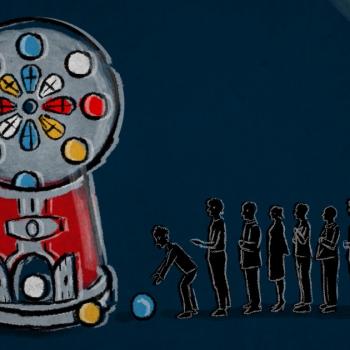When I ask people, “What do you want?” The #1 answer I get is, “I just want to be happy.” Happiness is a hard enough goal to achieve but Christians have an extra hurdle. Upon expressing a  desire for happiness, many of my Catholic clients immediately say, “But I feel guilty because God doesn’t really care about my happiness. He wants me to be holy.”
desire for happiness, many of my Catholic clients immediately say, “But I feel guilty because God doesn’t really care about my happiness. He wants me to be holy.”
Are Happiness and Holiness Mutually Exclusive?
I have often heard the phrase, “God desires our holiness more than our happiness.” I understand the sentiment, but I don’t necessarily agree and I’m fairly certain our Church doesn’t agree either. I think this view is predicated on the notion that authentic happiness and holiness are mutually exclusive. If that were true, I would certainly think that choosing holiness was the better part. But I would suggest that this is an error. The truth is that holiness is actually the fruit of authentic happiness–it is difficult to have the former if you don’t have the latter.
“Authentic Happiness” VS. Mere Enjoyment
Psychologists define “authentic happiness” as the stable experience of joy that comes from pursuing a life that is meaningful (i.e., uses one’s gifts to benefit others), intimate (i.e., having healthy,  rich, loving relationships), and virtuous (i.e., exhibiting the strength to use whatever life throws at you as an opportunity for growth and development). Authentic happiness is differentiated from mere enjoyment, which is transient and rooted in the pursuit of pleasure and the avoidance of conflict. The answer to the question of whether God desires our happiness, I would argue, depends on whether you define happiness as “authentic happiness” (what we Christians call the virtue of “Joy”) or mere enjoyment.
rich, loving relationships), and virtuous (i.e., exhibiting the strength to use whatever life throws at you as an opportunity for growth and development). Authentic happiness is differentiated from mere enjoyment, which is transient and rooted in the pursuit of pleasure and the avoidance of conflict. The answer to the question of whether God desires our happiness, I would argue, depends on whether you define happiness as “authentic happiness” (what we Christians call the virtue of “Joy”) or mere enjoyment.
Authentic Happiness Facilitates Holiness
Assuming that you mean “authentic happiness/joy” I would suggest that the pursuit of happiness–especially if it is done in a spirit of prayer– actually facilitates holiness because true holiness is the fruit of an attempt to live a meaningful, intimate and virtuous life in cooperation with God’s grace. It is exactly because of this understanding that Popes have made so many statements in support of the pursuit of happiness.
3 Popes Say, “Be Happy!”
For instance, Pope St. John Paul the Great said in 2002, “People are made for happiness. Rightly, then, you thirst for happiness. Christ has the answer to this desire of yours. But he asks you to trust him.”
Pope Benedict XVI, picked up the theme of authentic happiness specifically when he said in 2012, “God wants us to be happy always. He knows us and he loves us. If we allow the love of Christ  to change our heart, then we can change the world. This is the secret of authentic happiness.”
to change our heart, then we can change the world. This is the secret of authentic happiness.”
Today, an Argentine newspaper printed the first part of a multipart interview with Pope Francis in which he lists his thoughts on a 10-point plan for happiness. Here is a summary of those points.
Pope Francis 10-pt Happiness Plan
1. Acceptance–The Pope said, “The Romans have a saying, which can be taken as a point of reference. They say: Campa e lascia campà’ (live and let live). That’s the first step to peace and happiness.”
I suspect this comment will raise some eye-brows, but I think there is something deeper going on here than the Pope saying–as some might suggest–that its none of our business how other people live. Rather, I think his point is rooted in the Ignatian practice (he is a Jesuit after all) of “charitable interpretation” in which we realize that even when people aren’t being their best, they have what they consider to be good reasons for acting that way. Unless we know those reasons (and we won’t unless they tell us) then we are obliged to assume that they are where God wants them to be right now and that he is working things out in their life in his own good time. This benevolent acceptance is different than permissiveness that says, “Do what you want, I don’t care.” which, I would suggest, and I suspect the Pope would agree is actually quite contrary to the Gospel.”
2. Giving oneself to others. —“Be giving of yourself to others.” People need to be open and generous toward others, he said, because “if you withdraw into yourself, you run the risk of becoming egocentric. And stagnant water becomes putrid.”
3. Take time for quiet reflection/mindfulness. — “Proceed calmly” cultivate, “the ability to move with kindness and humility, a calmness in life.”
4. Enjoying leisure time with family. –Francis then recalled that when he was in Buenos Aires, he would often ask young mothers how often they play with their children. “It was an unexpected question,” he said. “It is hard. The parents go to work and come back when the children are asleep.” But he said although it is difficult to find the time, “it must be done.”
5. Make Sunday a family day. —“Sunday is for family,”
6. Meaningful & rewarding work.–“It’s not enough to give them food,” he said. “Dignity is given to you when you can bring food home”
7. Taking time in nature and caring for it– “I think a question that we’re not asking ourselves is: ‘Isn’t humanity committing suicide with this indiscriminate and tyrannical use of nature?'”
8. Respecting differences between people–“We can inspire others through witness so that one grows together in communicating. But the worst thing of all is religious proselytism, which paralyzes: ‘I am talking with you in order to persuade you,’ No. Each person dialogues, starting with his and her own identity. The church grows by attraction, not proselytizing,”
9. Letting go of offenses and renouncing negativity–“Needing to talk badly about others indicates low self-esteem. That means, ‘I feel so low that instead of picking myself up I have to cut others down,'” Letting go of negative things quickly is healthy.”
10. Seek to make peace with others.–“the call for peace must be shouted. Peace sometimes gives the impression of being quiet, but it is never quiet, peace is always proactive”
Bottom line, the Church is not an enemy of your happiness. The Church wants you to experience the kind of authentic happiness that satisfies your heart and your soul, both in the present and in the hereafter as well!
If you’d like to learn more about how your faith can help you be happier in your life and relationships, I’d invite you to learn more about the Pastoral Solutions Institute Tele-Counseling practice. Let us help you experience what living the Joy of the Gospel can do for your marriage, family and personal life.
















